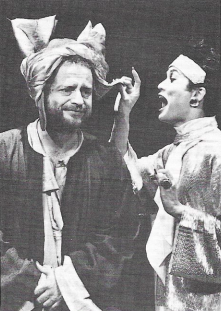BUSMAN’S HOLIDAY
Lanford Wilson insists that he’s not abandoning playwriting in favor of translation—but he’s also quick to extol its virtues, as a break from writing plays. “It takes an entirely different kind of energy to translate,” he says. “It’s like a busman’s holiday.”
Wilson recently completed a translation of Chekhov’s The Three Sisters, which is currently running at the Hartford Stage Company under the direction of its artistic director, Mark Lamos. “It was Mark’s idea that I do it, and under most circumstances I never would have considered it,” relates Wilson. “But I was in the process of working on Angels Fall, and really getting burned out. I had decided that I couldn’t write another play for at least a year, and the idea of translation appealed to me.”
When Wilson agreed to take on the project, he didn’t speak a word of Russian, but he devised what he thought was a reasonable plan of attack. ‘I decided to get a tape of the Moscow Art Theatre production in Russian, a copy of the play in Russian, and then commission two literal translations—one by an American who knew Russian and one by a Russian well-versed in English.” But after he had assembled all these items, he decided that the task was, in a word, impossible: “When I looked at the Russian text, I couldn’t even tell where the play began, and so I did what I felt I had to do: I took Russian lessons.”
Spending more on the lessons than he was being paid to translate the play, Wilson studied intensively, three hours a day, five days a week for close to three months. (“Well, holidays cost money,” he shrugs.) He’s the first to admit that he’s not yet near fluency, but he learned enough so that he could read the text in the original language, and look up words when he needed to. “I think I looked up every single word in the entire play,” he admits. “But the final product is definitely a translation, not an adaptation. My intention was to remain true to Chekhov, to communicate his lyricism and his playability—and also his startlingly simple speech. I simply could not have worked from literal translations. I had to work from the original.”
Wilson feels that the particular achievement of his translation—it’s already been praised by a Russian scholar with whom he conferred—is that he’s “shaken the British sound out of the language. It’s not jazzy. but its quintessentially American.” Participating in the rehearsal process also yielded some changes in the script, which continued to evolve right up to the opening.
From his experience, Wilson has decided that the art of translation should naturally fall to playwrights. “It takes a playwright to understand the problems inherent in other playwrights’ works,” he insists. But after spending a year of his life on The Three Sisters, he has no immediate plans to tackle another translation project. Maybe someday, but for now, it’s back to playwriting.
—Laura Ross
PERMISSION GRANTED
It’s not unusual for an actor to confer with his agent or lawyer before accepting a role. But recently, David Carradine sought counsel from a somewhat less common source. Before taking on the part of the Oglala Sioux holy man in Black Elk Speaks, Carradine visited the Pine Ridge Reservation in Oklahoma to receive permission of the Black Elk family. Permission was indeed forthcoming, and the play, based on the book by John G. Neihardt and adapted by Christopher Sergel, can be seen April 18-21 at the Tulsa Performing Arts Center.
A production of the American Indian Theatre Company, Black Elk Speaks is also being filmed by Nebraska ETV Network for the PBS American Playhouse series, for release throughout America four limes over the next three years. The filming is taking place on location in South Dakota and Nebraska.
The play, directed by Tom Brennan, has a 31-member cast, including three great grandchildren of Black Elk himself. Producer JR Matthews. himself a Quaraw-Seneca Indian and artistic director of the American Indian Theatre Company, states that in his 1931 epic, Neihardt “fused into one great visionary voice the spiritual truths and cultural realities of a people.” Neihardt lived much of his life among American Indians and is known as the “poet laureate of the plains.” In the 53 years since his book appeared, it has been reprinted 29 times in nine languages.
SHHHH!

Craig Smith suffers verbal abuse from A. Mapa in Epicoene, or The Silent Woman, currently running at the Cocteau Repertory in New York. Ben Johnson’s rarely produced Elizabethan comedy details the torment of a man who hates noise, combining broad farce and acerbic wit into a play which has perplexed critics for centuries. Set by director Gerald Chapman in modern-day New York, the play runs in repertory with The Beaux’ Stratagem and The Oresteia through April 20.
HEROES IN A HURRY
Hamlet , Faust and Oedipus in an hour? Even for theatregoers who aren’t in a hurry, Stuart Sherman’s Classical Trilogy, on stage this month at the Minneapolis College of Art and Design, should provide a surprising new look at theatre history’s best-known heroes. These characters, Sherman feels, “are just like objects. We’ve become so used to them that we’ve stopped seeing them—they’ve become part of the bloodstream of our cultural life.”
Performance artist Sherman, known for his multimedia “spectacles” which utilize common objects manipulated on a tabletop, has retained the narrative structures of the plays in his Trilogy, while analyzing their characters, situations and themes through visual and theatrical means. Use of the original text is minimal and, he says, “‘”equal in importance to the other production elements.”
Of the three works, only Oedipus is new. His 25-minute Hamlet was commissioned by Amsterdam’s Mickery Theatre and first presented at the Holland Festival in June 1981. Faust—a brief five minutes in length—was commissioned by Theater am Turm in Frankfurt, West Germany. Sherman plays the title character in each of the plays, which run April 10-14.
BI-COASTAL BUDDIES
William Mastrosimone’s Shivaree, currently running at Long Wharf Theatre, traveled a long way to get to its new Connecticut home. The production originated at the Seattle Repertory Theatre, where it ran last fall in the small PONCHO Forum of the company’s recently completed Bagley Wright Theatre complex. At Long Wharf, it has taken up residence in the slightly larger, 199-seat Stage II.
Seattle Rep artistic director Daniel Sullivan directed the play, which he began working on with Mastrosimone last season for a workshop as part of the Rep’s Other Season new play project. According to Sullivan, author and director have continued to work on and revise the script throughout the process. “I couldn’t have found a less likely playwright to work with and yet I couldn’t have enjoyed him more,” remarked Sullivan. “Having grown up in California, East Coast natives have always seemed a bit exotic to me; a tough, serious, short breed of whom people from New Jersey seem the shortest and most exotic representatives. Bill Mastrosimone is from Trenton, in the darkest heart of New Jersey, and I felt he could not possibly understand a man like myself, who was brought up without incident in the vague Western paradise of California. Surprisingly, we worked together most productively. He’s not territorial. He doesn’t care where a suggestion originates as long as it improves the script, and he’s constantly looking for new ideas.”
Shivaree‘s five-member cast remains intact, and Robert Dahlstrom’s set has undergone only minor alterations for the Long Wharf production. The bi-coastal move is a first for the Seattle company. Shivaree can be seen through April 22.
LOVE’S LABOUR’S… LOST
Only a few hours after William Shakespeare was named Man of the Year in Calhoun County, Ala., the theatre which bears his name was struck by arson, destroying $250,000 worth of handmade period costumes. The Alabama Shakespeare Festival, which is planning a 1985 move from its birthplace in Anniston to a multimillion dollar complex in Montgomery, intends to go on with an Anniston season this summer, provided sufficient funds for rebuilding the destroyed stock can be raised.
Jim Volz, the theatre’s managing director, expressed the company’s astonishment at the loss: “It’s like los-ing a DaVinci or Monet painting that can’t be replaced.” The 12-year supply of elaborate costumes, fashioned by volunteers from the Alabama Shakespeare Festival Guild, was housed in an otherwise vacant school building.
Joining fund-raising efforts on behalf of the Festival was Joan Mondale, wife the the Democratic front-runner, who visited Anniston to hold a benefit and meet with prominent area arts leaders. Support for the rebuilding effort has ranged from a $30,000 grant from the City and a $5,000 emergency grant from Governor George Wallace, to $10 from a loyal supporter who is working two jobs and living in a church garret while studying for the priesthood. “We were eaten up with pride over those costumes,” said Guild member Mary Hobbs. “It really was a labor of love.”
TOGETHER AGAIN
Early in his playwriting career, Sam Shepard visited Joseph Chaikin’s Open Theater and the creative relationship that grew up between the two men bore fruit twice in the past: in 1978 they created Tongues at the Magic Theatre, and a year later collaborated on Savage/Love while in residence at the New York Shakespeare Festival. Last February, the two met again—this time at the American Repertory Theatre in Cambridge—to work on yet another project.
Neither of them had any idea what would evolve when they got together—whether their work would culminate in a performance or even a script—but each day for several weeks the two secluded themselves in a rehearsal room at Harvard and worked. At several points they called in other artists, including an actress and a composer, to join them. Around the end of the month, it became clear to them both that the project they envisioned—dealing with, among other things, a Mormon legend about an angel who fell to Earth in Utah—was much larger than they first suspected. Perhaps it would even be a full-length play. Since each of them had to leave to fulfill other commitments, they left the project unfinished, but not by any means forgotten. Shepard took home with him to Santa Fe, N.M., the nearly 40 pages of script they’d already developed, intending to work on it at his typewriter.
If indeed the project does lead to a scripted work, American Rep hopes that it might have the opportunity to produce it, according to managing director Rob Orchard. But even if that is not the case, it has extended an open invitation to the two artists to return at any time and work further on the project. Speaking on behalf of the company, Orchard insisted, “The last thing we want to do is institutionalize or categorize the project. Our function at this point is to provide a shelter—and just wait and see what evolves.”
AT HIS ROPE’S END

Honor, infamy and justice are the heady topics explored in The Mayor of Zalamea, Pedro Calderon de la Barca’s 17th century drama currently running at the Folger Theatre in Washington, D.C. Director Michael Bogdanov, associate director of London’s National Theatre, recreates his critically acclaimed 1981 National production in this American premiere of the work. As in many of Calderon’s plays, The Mayor—sub-titled “The Best Garrotting Ever Done”—exposes the clash of values between the peasant and aristocratic classes of his contemporary Spain, complete with liberal doses of humor and bloodshed. Left, Daniel Massey as rapacious Captain don Alvaro de Ataide is about to pay for his crimes against the Mayor’s daughter.
PARTNERS FOR ‘GILLIAN’
New York’s Ensemble Studio Theatre, founded in 1971 to develop new plays and support individual artists, is an active partner in a commercial production, for the first time in its history. Michael Brady’s To Gillian on Her 37th Birthday opened on March 22 at the downtown Circle in the Square as a co-production of EST and M2 Productions, which raised $300,000 financing for the play.
EST has retained artistic control of Gillian, which began as a staged reading and moved on to full professional production at its own theatre last season. The play concerns a widower coming to terms with his wife’s death.
A membership organization, EST serves about 300 actors, directors, playwrights and designers, and operates a 99-seat and a 50-seat theatre. Another play developed there, Shirley Lauro’s Open Admissions, opened recently on Broadway, but in that case, substantial revisions were made after the EST production, so the theatre did not share in the venture.
CLOSING DOORS
This year’s theatre season has sustained at least a temporary casualty, as a New York company suspends operations for the present.
CSC Repertory, also known as City Stage Company, closed its doors on Jan. 29, cutting short its run of a radical interpretation of Hamlet. Christopher Martin, CSCs artistic director over its entire 16-and-a-half-year history, states that the company is attempting to eliminate its deficit and generally retrench. “We need new income sources, a new board of directors—but we want to keep doing the same kind of work we’ve been doing right along: classics in the present tense, along with important contemporary plays.”
The company is currently looking into co-production arrangements where it would maintain artistic control while obtaining financing from elsewhere.
GIMME SHELLEY

Now more than 160 years old, Mary Shelley’s tale of Victor Frankenstein and the misshapen creature into which he breathes life has been fertile ground for playwrights and screenwriters. Yet the full version of Shelley’s sprawling, emblematic novel remains unfamiliar to most people. The Children’s Theatre Company in Minneapolis has set our to change that with its Frankenstein, which runs through April 1. Those reared on the lumbering Boris Karloff characterization of the creature might be surprised by the articulate, agile being created by CTC in an attempt to remain true to Shelley’s original vision. Above, Victor Frankenstein (Tom Dunn, center) relates his tale to a band of explorers (Michael Welch, George Muschamp and Philip Eaton) who discover him half-mad in the Arctic wilderness. The play was adapted by Thomas W. Olson and directed by John Clark Donahue.
‘SUNDAY’ WITH SONDHEIM
Among April’s New York openings are the newest Stephen Sondheim musical and yet another play by Broadway’s current King Midas, Harvey Fierstein. Sunday in the Park with George, created by Sondheim and James Lapine in workshops last summer at Playwrights Horizons, was inspired by Georges Seurat’s pointillist painting, “A Sunday Afternoon on the Island of La Grande Jatte.” One hundred years pass between its two acts: the first is set in 1884, when Seurat began work on the painting, and the second brings us up to the present. Mandy Patinkin and Bernadette Peters are featured in the production, which takes over the Booth Theatre on April 22, jointly produced by the Shubert Organization, Emanuel Azenberg and Playwrights Horizons. Lapine directs.
Playwright Harvey Fierstein, apparently not quite content with two simultaneous successes (Torch Song Trilogy and La Cage aux Folles), is shooting for a third, as his Spookhouse opens Off Broadway at Playhouse 91 on April 4, under the direction of Eric Concklin. (Concklin was also responsible for early Off-Broadway productions of Torch Song Trilogy.) Fierstein has described the play as a black comedy set in Brooklyn, inspired by his own childhood experiences at Coney Island. Spookhouse is produced by Terry Allen Kramer and Harry Rigby, and features Anne Meara in the lead role.
JONES AWARD GOES TO LAAT
The Los Angeles Actors’ Theatre and its producing/artistic director Bill Bushnell have been named winners of the 1983 Margo Jones Award. The prize, named for the late Dallas producer who was a pioneer of the regional theatre movement, honors an American or Canadian theatre devoted to the development of new plays and playwrights. LAAT is scheduled to move this year into a new four-theatre performing arts complex in downtown Los Angeles. ❑

